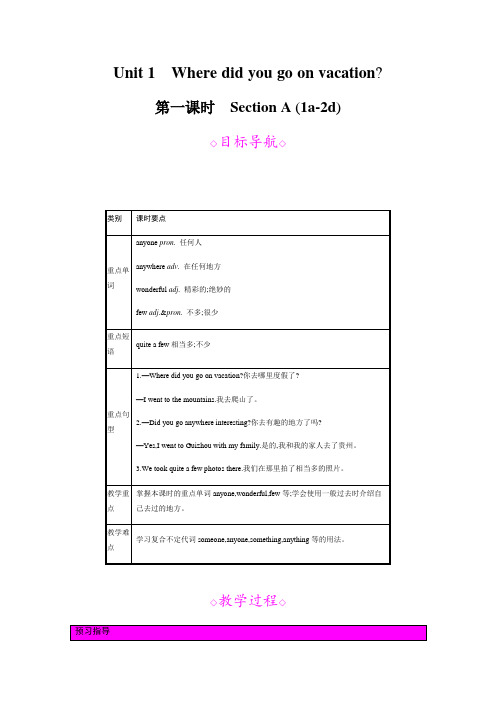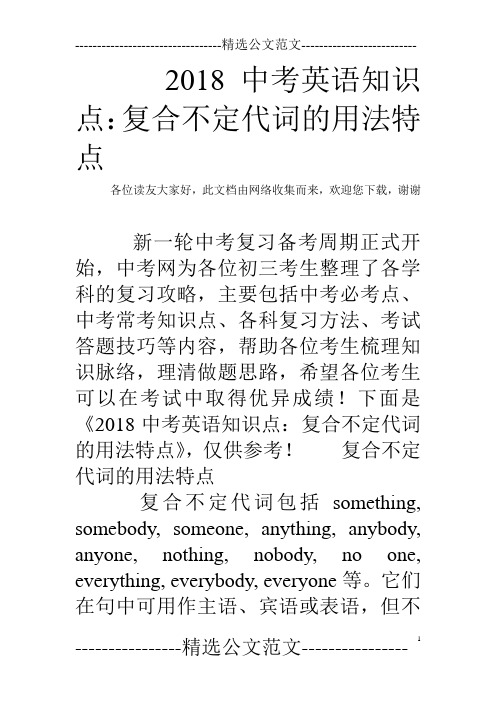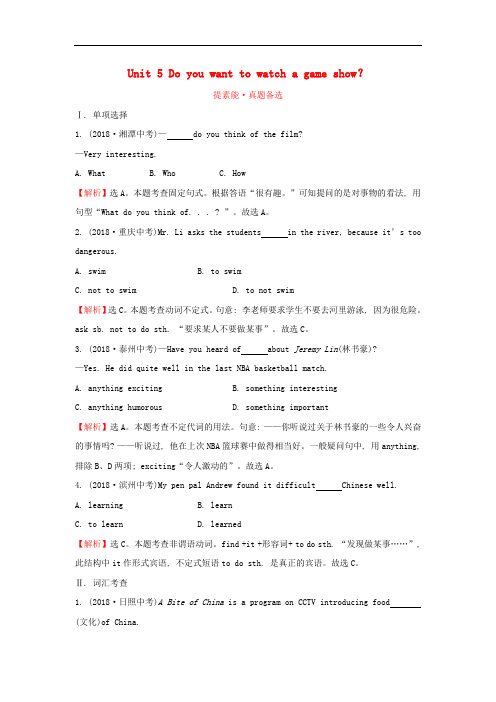【中考英语】2018最新初中英语复合不定代词(人教新目标版)
- 格式:ppt
- 大小:233.50 KB
- 文档页数:25

Unit1Where did you go on vacation?第一课时Section A (1a-2d)◇目标导航◇◇教学过程◇一、方法指导预习教材Page 1~2,标注不认识的单词。
然后翻到生词表,通过读和写基本了解本课时的单词。
二、预习检测Ⅰ.汉译英1.任何人anyone2.在任何地方anywhere3.精彩的;绝妙的wonderful4.不多;很少few5.相当多quite a fewⅡ.根据句意及汉语提示完成句子1.Did you go shopping with anyone(任何人)?2.You can buy clothes like these anywhere(在任何地方).3.We had a(n) wonderful(精彩的) time in China.4.I have to buy a(n) few(不多) things at the shop.5.Helen took quite a few(相当多) photos of Huangguoshu Waterfalls.Step1情景导入Teacher:Hello,everyone.Your vacation was over.How was your vacation?What did you do?Where did you go on vacation?Did you go anywhere interesting?Who did you go with?Then do you know how to answer the questions with the Simple Past Tense?We will learn about it.Step2完成教材1a-1c的任务1.认真观察1a中的图片,将所给短语与图片的活动进行搭配,并大声朗读短语。
2.认真听录音,按你听到的顺序给图中的人物编号,核对答案并朗读对话。

2018年中考英语试卷及答案一、单项选择(共15小题;每小题1分,计15分)从a、b、c、d四个选项中选出一个可以填入空白处的最佳答案。
1.______april 1 china announced that it would build the xiongan new areain hebeiprovince.a. onb. inc. atd. to【答案】a【解析】考查介词。
句意:四月1号,中国正式宣布将在河北修建一个雄安新区。
april,四月,在月份前介词会用on,故挑选a。
2.jackie chan won an oscar after______56-year-long career in the film industry.a. heb. hisc. himd. himself【答案】b【解析】实地考察代词。
句意:在成龙52年的电影职业生涯中,他赢得了奥斯卡奖。
这里则表示“他的职业生涯”,用his,故挑选b。
3.______fine weather it is! let’s go on a picnic!a. what ab. whatc. howd. how a【答案】b【解析】考查感叹句。
句意:多么不好的天气啊!使我们回去野餐吧!首先,weather为不能可数名词,前面无法提不定冠词,故确定a、d。
感叹句存有两种,一种就是用what鼓励,润色名词,格式为what+(a/an)+形容词+名词+主语+谓语+其它成份;how鼓励的感叹句主要润色形容词或副词,格式为how+形容词(或副词)+主语+谓语+其它成份。
这里就是对天气展开感慨,就是名词,故挑选b。
4. when a virus comes into our body, we get ill. the same thing______also happen to a computer.a. shouldb. needc. cand. must【答案】c【解析】考查情态动词。

知识梳理:【教材原句】Did you go with anyone? 你和其他人一起去的吗?No. No one was here. Everyone was on vacation. 不。
没人在这儿。
大家都在度假。
Everything tasted really good! 一切尝起来都很棒!【概念】不指明代替任何特定名词或形容词的代词叫不定代词。
【常见的不定代词】everything 每件事;一切1. some系列的词主要用于肯定句中;any系列的词主要用于疑问句、否定句中。
它们都既可修饰可数名词,也可修饰不可数名词。
【例句】There is something wrong with her. 她生病了。
There isn’t anyone in the classroom. 教室里没有人。
提示:在Would you like sth.?一类的问句中用some,不用any。
2. 由some, any, no, every构成的复合不定代词作主语时,谓语动词用第三人称单数形式。
【例句】Everyone in China likes the Spring Festival. 在中国,人人都喜欢春节。
3. 形容词修饰不定代词时,通常放在不定代词的后面。
【例句】Please do something special. 请做些特别的事情吧。
4. 几组不定代词的区别:① both, either, neither这三个词都指两者,both表示“两者都”,either表示“两者中的任何一个”,neither表示“两者都不”。
【例句】—Which do you like better, tea or coffee? 你更喜欢哪个,茶还是咖啡?—Neither, I like water better. 两者都不,我更喜欢水。
② a few; few;a little; little★ a few, few用来修饰可数名词,a little, little用来修饰不可数名词。

人教新目标英语八年级上册Unit 1 单元知识点讲义1.复合不定代词:指人: someone anyone no one everyone某人某人,任何人没有人每人somebody anybody nobody everybody指物:something anything nothing everything某物某物,任何事物没有东西每件事物1) 复合不定代词做主语,谓语动词用单三.Ex. Someone is waiting for you at the door.Nobody knows the answer to the question .2) some…一般用于肯定句中,any…一般用于否定句和疑问句中.Ex. There is something in the room .There isn’t anything in the room .Is there anything in the room ?I have something to do today .I don’t have anything to do today .There is someone outside the door .There isn’t anyone outside the door.Is there anyone outside the door ?3) 在表示邀请,请求,建议希望得到对方肯定回答时,用some… , 不用any…Would you like something to drink / eat ?4) 肯定句中anything 表示任何事物, anyone = anybody 任何人Ex. Anything is OK.I can do anything for you .Anybody knows the answer.5) 形容词或to do 形式修饰复合不定代词时要后置.Ex. There is nothing wrong with my car.I have something important to tell you .There isn’t anything interesting here .Do you want something to drink / eat ?6) not everybody / everyone / everything 表示部分否定,意为‘并非都…’Ex. Not everyone likes singing .Not everything goes well .not any …和no…表示全部否定Ex. He listened ,but heard nothing .He listened ,but didn’t hear anything .not anything = nothing not anyone/ body = no one / nobodyEx. There is nothing in the bottle . = There isn’t anything in the bottle.7) no one 指人,回答Who 提问, no one of … / nobody 不能加ofnothing 指物, 不能加of none 指人或物,回答Is there …? 提问none of …Ex. Who is in the room ? No one .Is there anyone in the room ? None .2.表地点复合不定副词:somewhere anywhere某地,肯定句中某地,否定句和疑问句中/ 任何地方,肯定句中nowhere everywhere没有地方到处,每个地方, 用于肯定句中Ex. I want to go somewhere interesting .3.wonderful adj. 精彩的Ex. We had a wonderful time on the beach .It is such a wonderful film that we all enjoy it .who…wonder v. 想知道what…引导的宾语从句,用陈述句语序why…Ex. I wonder who the boy is . = I want to know who the boy is .I wonder what they are doing . =I want to know what they are doing .wonder +特殊疑问词+ to doEx. I wonder what to do . = I want to know what to do . = I wonder what I should do.I wonder where to go . / I wonder how to do that .4、几乎没有few 后接可数名词复数(否)little 后接不可数名词肯 a few 有一些,后加可数名词复数quite a few 相当多,不少a little 有点,后加不可数名词quite a little相当多,不少only a few 只有一点only a littlevery few 非常少very littleEx. I have a few friends. 肯I have few friends . 否I have quite a few friends .a little 修饰adj. = kind of= a little bit5. most of the time 大部分时间most of the foodmost of us/themmost of + n. = most +n.Ex. Most of the students like English . = Most students like English .6. Of course . = Sure. = Certainly . 当然.7. 反身代词第一人称:myself ourselves 我们自己第二人称:yourself 你自己yourselves 你们自己第三人称:himself 他自己herself 她自己itself 它自己themselves 他们自己8. seem 似乎,好像1) seem to be +形容词/名词= seem + 形容词/名词似乎…Ex. That seems to be her mother . = That seems her mother .It seems to be too difficult . = It seems too difficult.2) seem to do sthHe seems to have a cold.3) It seems that + 从句.It seems that he is happy. = He seems to be happy . = He seems happy.9. adj. bored 感到无聊的修饰人boring 令人厌烦的修饰事或物I feel bored , because the movie is boring.be bored with …对…感到无聊Ex. I’m bored with the boring movie.10. keep / write a diary = keep /write diaries 记日记(keep优先使用)11. activity n. 活动activities 复数Ex. What activities did you find interesting ?12. decide 决定1) decide to do sth. 决定做某事= make a decision to do sth = make one’s mind doing sthThey decide to visit the museum.decide not to do sth 决定不要做某事decide + 疑问词+动词不定式He can not decide when to leave.2) decide + 宾语从句(陈述句语序)He can’t decide when he leaves .I can’t decide where I should go. 改为同义句I can’t decide where to go.13. try to do sth. 努力尽力去做某事Ex. You must try to pass the exam.try doing sth. 试着做某事Ex. He tried making a model plane.try one’s best to do sth = do one’s best to do sth 尽最大努力做某事Ex. You should try your best to learn English well .have a try 试一试try on 试穿Ex. Let me have a try .14. feel like1)给……的感觉,后接从句He feels like he is swimming.I felt like I was a bird.2) feel like 想要后接名词/代词/doing sthfeel like doing sth = want to do sth =would like to do sth想要做某事Do you feel like taking a walk with me ?Do you want to take a walk with me ?3) feel + 形容词, 感到…I feel bored .look +adj. sound+adj. feel +adj.look like +n. sound like+n. feel like +n.15.look 看起来taste 尝起来be( was were is am are)sound 听起来feel 感觉摸起来系动词+adj.smell 闻起来seem 似乎16. build v. 建筑n. 体格of medium build 中等身材building n. 建筑物,大楼builder n. 建筑师16.difference n. 不同点-----differences n. 复数different adj. 不同的be different from …不同于… = not the same as…Ex. 1) Chinese names are different from English names. = Chinese names aren’t the same as English names .2) I’m different from you . = I’m not the same as you .3) I can’t see the differences between the buses in the picture.n. 不同之处17. on the top of the hill在山顶, 面at the top of the hill 在山顶, 点(最高点)at the foot of the hill在山脚下walk up to the hill top 径直走向山顶come top 登顶,得第一Ex. He always comes top every exam.18. wait for + 人或物wait 不及物动词,连接forEx. I’ll wait for you at the door.He waited over an hour for the train . ( He waited for the train over an hour. )can’t wait to do sth 迫不及待做某事Ex. The wonderful vacation , I can’t wait .19. because + 从句because of + n./ pron./ doingBecause the weather was bad, we couldn’t see anything below.Because of the bad weather, we could n’t see anything below.20. enough 1) adj足够的,修饰名词做定语We have enough time to do our homework.I have enough money .2) adv.足够地,充分地,用来修饰形容词或副词,一般置于被修饰词之后I know him well enough.我足够了解他。

2018中考英语知识点:复合不定代词的用法特点各位读友大家好,此文档由网络收集而来,欢迎您下载,谢谢新一轮中考复习备考周期正式开始,中考网为各位初三考生整理了各学科的复习攻略,主要包括中考必考点、中考常考知识点、各科复习方法、考试答题技巧等内容,帮助各位考生梳理知识脉络,理清做题思路,希望各位考生可以在考试中取得优异成绩!下面是《2018中考英语知识点:复合不定代词的用法特点》,仅供参考!复合不定代词的用法特点复合不定代词包括something, somebody, someone, anything, anybody, anyone, nothing, nobody, no one, everything, everybody, everyone等。
它们在句中可用作主语、宾语或表语,但不能用作定语。
something, someone等和anything, anyone等的区别与some和any 的区别一样,前者一般用于肯定句,后者一般用于否定句、疑问句或条件句。
具体使用时应注意以下几点:1.复合不定代词受定语修饰时,定语应放在它们后面:There is nothing wrong with the radio.这收音机没有毛病。
Have you seen anyone [anybody] famous?你见过名人吗?2.指人的复合不定代词若用作主语,其谓语动词一般用单数,相应的人称代词和物主代词也用单数he, him, his 。
但在非正式文体中常用复数代词they, them, their:Everyone knows this, doesn’t he [don’t they]?人人都知道这一点,不是吗?If anybody [anyone] comes, ask him [them] to wait.要是有人来,让他等着。
3.指事物的复合不定代词若用作主语,谓语动词只能用单数,相应的人称代词也只能用it,而不用they:Everything is ready, isn’t it?一切都准备好了,是吗?4.不定代词anyone, everyone等只能指人,不能指物,且其后一般不接of短语。

Unit 5 Do you want to watch a game show?提素能·真题备选Ⅰ. 单项选择1. (2018·湘潭中考)—do you think of the film?—Very interesting.A. WhatB. WhoC. How【解析】选A。
本题考查固定句式。
根据答语“很有趣。
”可知提问的是对事物的看法, 用句型“What do you think of. . . ? ”。
故选A。
2. (2018·重庆中考)Mr. Li asks the students in the river, because it’s too dangerous.A. swimB. to swimC. not to swimD. to not swim【解析】选C。
本题考查动词不定式。
句意: 李老师要求学生不要去河里游泳, 因为很危险。
ask sb. not to do sth. “要求某人不要做某事”。
故选C。
3. (2018·泰州中考)—Have you heard of about Jeremy Lin(林书豪)?—Yes. He did quite well in the last NBA basketball match.A. anything excitingB. something interestingC. anything humorousD. something important【解析】选A。
本题考查不定代词的用法。
句意: ——你听说过关于林书豪的一些令人兴奋的事情吗? ——听说过, 他在上次NBA篮球赛中做得相当好。
一般疑问句中, 用anything, 排除B、D两项; exciting“令人激动的”。
故选A。
4. (2018·滨州中考)My pen pal Andrew found it difficult Chinese well.A. learningB. learnC. to learnD. learned【解析】选C。
初中英语不定代词的用法和辨析作者:单晓亮来源:《新高考·升学考试》2018年第10期初中英语中的不定代词有 all, each, both, either, neither, one, none, little, few,many, much, other, another, some, any, no,(a) few,(a) little, both, enough,every 等,以及由 some, any, no 和 every 构成的合成代词(即somebody, anyone, nothing 等)。
不定代词可以代替名词和形容词,表示不同的数量概念。
不定代词没有主格和宾格之分,在句中可做主语、宾语、表语、定语等。
常用不定代词如下表所示:1.; all 和both(1); all表示全部,表示三者或三者以上的人或物;both指代两个人或事物,表示两者都。
There are trees on both sides of the street.街道两旁都有树。
All women like nice clothes.所有的女性都喜欢漂亮衣服。
(2); all和both都可以与定冠词连用,置于定冠词之前。
Are all the students here today?今天所有的学生都到了吗?(3) all,both与not连用表示部分否定。
All birds can not fly. 不是所有的鸟都会飞。
【中考链接】(2016·阜康市)Old Mr. Black lives happily with his three dogs._______ of them are part of his family.A. Both;B. All;C. None;D. Neither【解析】老布莱克和他的三条狗生活得很幸福,它们都是他的家庭的一部分。
Both两者都; All所有都;None既可指三者以上的人,也可指物,意为“没有人; 一个也不”;Neither两者都不。
2018年中考英语语法知识点总结(名师总结教材重点,绝对精品,建议大家下载打印背诵)名词名词的种类专有名词普通名词国名、地名、人名、团体、机构名称可数名词不可数名词个体名词、集体名词抽象名词、物质名词考点1:可数名词一、基本用法(1)可数名词后可以加-s或-es构成复数形式,用于表达超过―一个‖的数的概念。
(2)只与可数名词复数连用的单词:few(几乎没有),a few(一些), many/a great many(许多)(3)既能与可数名词连用也能与不可数名词连用的单词:some, any, a lot of/lots of, plenty of。
例如:There is some/a lot of milk in the bottle.There are some/a lot of flowers in the garden.二、名词单复数规则变化规律例词①一般在词尾直接加s book—books chair—chairs②以s, x,o, sh, ch结尾的单词通常在词尾加es class—classes box—boxes brush—brushes watch—watches③以辅音字母+y结尾的词,把y改i,再加es但以元音+y结尾的词,则直接在词尾加s family—families factory—factories key—keys monkey—monkeys④以o结尾的词,有生命的名词加es但无生命名词则直接加s,如:potato—potatoes tomato—tomatoes hero—heroes radio—radios zoo—zoos⑤以f或fe结尾的词,改f或fe为v 加es leaf—leaves thief—thieves三、名词复数的不规则变化规律例词①变中间的元音字母man—men,woman—women,foot—feet,tooth—teeth, child—children, mouse—mice②表示―某国人‖的名词单复变化(记忆口决:中日不变英法变,其余s 加后面。
人教版八年级英语上册短语语法知识点总结初二英语课组2019年[由我校初二英语科组根据最新考纲和近几年中考的趋势加上我校学生的实际情况,结合初二全体英语科组的力量,汇编了这一份重点总结,编好一份学案不易,望同学们能好好利用。
]Unit 1 Where did you go on vacation一、必背单词短语。
Section A1.Where did you go on vacation? (P. 1)on vacation意为“在度假”,结构“on+名词”表示“在某种状态中”。
例句:My family went to Hainan on vacation last year.2....visited my uncle (P. 1)visit此处用作及物动词,后接人或物做宾语,意为“拜访、看望”,后接表示地点的名词,意为“参观、游览”。
例句:I visited my grandmother last week.例句:Do you want to visit Shanghai?3....go with anyone? (P. 2)(1)anyone用作不定代词,意为“有人、任何人”,相当于anybody,用于疑问句和否定句中,在肯定句中用someone或者somebody。
但是anyone也可以用在肯定句中,表示“任何一个人”。
例句:Did you meet anyone friendly in that city?例句:Anyone can be helpful in some way.(2)anyone只能指人,不可以指物,后面不接of短语;any one既可以指人也可以指物,后可接of短语。
例句:You can ask any one of us about this question.4....buy anything special? (P. 2)(1)buy用作双宾语动词,表示“买”,常用的结构为“buy sb. sth.”或者“buy sth. for sb.”,表示“为某人买某物”。